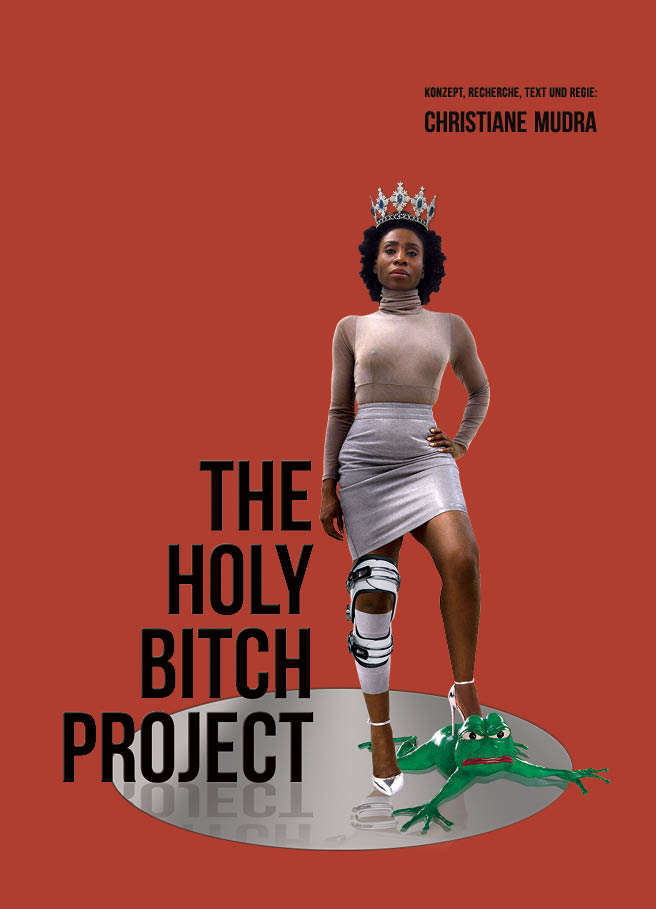The Holy Bitch Project
domestic, sexual and digital violence against women
by Christiane Mudra
World premiere: June 20, 2021 in Munich
Berlin premiere: November 02, 2022
Trailer der Uraufführung in München
In The Holy Bitch Project, Christiane Mudra investigates the dynamics of violence against women in Germany along with its cultural and societal breeding ground through interviews with affected women and experts.
In reference to the film Matrix (1999), the audience, like the film's hero Neo, swallows the red pill, which offers a glimpse behind the immaculate scenes. The audience follows the performers into an interactive labyrinth of game scenes and binaural sound in which domestic, sexualized and digital violence is made tangible. As the Alt-Right movement and misogynistic "Incels" use the film motifs to spread misogynistic conspiracy theories, The Holy Bitch Project deliberately makes the Matrix world its own and establishes a feminist counter-narrative.
In November 2019, a 28-year-old Berlin woman was stabbed to death by her partner because she wanted to end the relationship. The judiciary classifies the act as manslaughter, as in many similar cases, since the Federal Court of Justice ruled in 2008 that the motive in relation to a murder charge is to be contested if "the separation is expressed by the victim and the accused deprives himself by the act of what he actually does not want to lose." The man's claim to possession thus has a mitigating effect on punishment. The wording suggests a joint responsibility of the victim. At the end of September 2019, the Berlin Regional Court ruled that the term "Drecks-Fotze" (dirty cunt) for the member of the Bundestag Renate Künast was not a punishable insult. These court rulings exemplify the value systems women continue to face. Despite an overall decline in violence and increasing equality, a woman is killed by her partner or ex-partner every third day in Germany. The number of attempted homicides is three times higher. In 2019, nearly 115,000 women were victims of domestic violence. This trend is upward. Only one in one hundred raped women in Germany experiences the conviction of the perpetrator. After the Federal Court of Justice claimed a "willingness to make sacrifices" in marital sex in 1966, marital rape was not banned until 1997. The MeToo debate brought about widespread awareness of sexualized violence for the first time. However, real consequences have failed to materialize. Although intimate partner violence is equally prevalent across all educational and social strata and the vast majority of suspects are German citizens, the cliché that violence is linked to precarious living conditions or an immigrant background is falsely perpetuated.
Female politicians, journalists or activists who express controversial views are also bombarded with rape threats online.
In the area of stalking or monitoring one's own partner, digitization offers highly invasive tools such as the reading of mobile devices or the remote control of smart home systems through spy apps, which perfect psychological terror. Porn platforms allow anonymous users to upload and download videos, opening the door to abuse. These phenomena are not new. But digital means bring them to a head.
Simone de Beauvoir once wrote in "The Second Sex," "On ne naît pas femme; on le devient." How do women become women today? How do women become victims? How is a woman declared a trophy, a possession? What role does the female body play in capitalism? Has the female body long since become a battlefield?
With respect to unchanging statistics regarding violence, The Holy Bitch Project examines patriarchal structures, song lyrics glorifying violence, role models in fairy tales and love stories, the influence of the porn industry on aesthetics and sexuality, educational patterns and examples of the everyday devaluation or disenfranchisement of women, along with field reports of affected women and the legal situation in Germany. At the core are the questions: Where does violence begin? How can we as a society overcome patriarchal structures and stand up for equality and respect?
The aim of the evening is to raise awareness of the dimension of mental and physical violence against women, to bring members of all genders into conversation with each other, to set an example and to inspire action.
Antifeminists network online and internationally. They express a "fundamental right" to procreation, accuse feminists of oppressing real men and hold them responsible for the extinction of humanity, however defined.
After the far-right and misogynist Incel movement (Incel stands for Involuntary celibacy) formed in U.S. online forums and repeatedly promoted the killing of women, real acts of violence were not long in coming: After Elliot Rodger (2014, Isla Vista), for example, the Toronto assassin Alek Minassian had also left an unambiguous message behind: "The Incel Rebellion has begun". No later than with the Halle assassin who exhibited a similar mindset, this phenomenon has also arrived in Germany.
The backdrop for The Holy Bitch Project is the 1999 film "Matrix" (Latin for womb), whose makers, the Wachowskis, both later came out as transgender and named the Matrix film series as a metaphor for transition. As the alt-right movement and misogynist "incels" use the film motifs to spread misogynist conspiracy theories, The Holy Bitch Project consciously appropriates the Matrix world and establishes a feminist counter-narrative.
Where are my limits? Empowerment for women
Workshop with Susanne Funk on June 22, 2021 from 6 to 9 p.m.
Social pedagogue, family and trauma therapist Susanne Funk has been counseling women in cases of partner violence and supporting families after domestic violence for 17 years. In this workshop, she raises awareness by providing basic information on the forms, dynamics and effects of partner violence. She addresses the feelings of shame and silence of those affected by violence, perpetrators and their environment. She coaches self-awareness and self-assertion through theoretical and practical exercises and encourages ways out of powerlessness through self-determined action.
Digital security
Workshop with Daniel Moßbrucker on June 27, 2021 from 2-5 p.m.
When it comes to digital surveillance, many first think of intelligence agencies or cyber criminals. But real threats to women usually lurk elsewhere: what pictures should I not share online? How do I make my social media profiles as private as possible? How might my ex-boyfriend spy on me with a spy app? Can my partner read my WhatsApp messages if we are using the same Wi-Fi? Daniel Moßbrucker, journalist and digital security trainer, will answer these and other questions in an interactive workshop.

Reviews
'The Holy Bitch Project' is a stirring theatrical masterpiece.
Rarely does one experience an evening of theater that sticks with you so long, that keeps you on the edge of your seat so long after the performance has ended. (...) "The Holy Bitch Project" by Christiane Mudra at Pathos Theater is magnificent, compelling and designed to be impossible to escape.
Christiane Mudra has accomplished a research achievement that can already be understood as a comprehensive scientific study. This work is condensed in the fabulous, tremendously detailed program booklet, but above all it becomes emotionally tangible in the performance itself.
As a documentary theater specialist, Mudra dedicates herself to topics that hurt. Her inventory raises awareness, one thinks about one's own behavior, but they are also a wake-up call directed at the system and at society.
The panopticon of a thousand individual cases, which are never individual cases, gradually turns into tracking down the fault in the system. The game is up."
“Christiane Mudra's production program booklets alone are worth a visit to the theater. (...)
Mudra's project is more relevant than ever, and she makes it her task - similarly ambitious as in her trilogy about the right-wing radical links that run from National Socialism through to the present day - she makes it her business to illuminate as comprehensively as possible the background for the violent, degrading treatment of women. (...) Mudra has once again researched with a perfectionist drive;
(...) Whereas in earlier works the Western or the silent film were effective backdrops for the flood of information, this time Mudra finds a playful framework in the blockbuster "Matrix". (...) Mudra seizes the metaphor of the "red pill" and utilizes it for a feminist narrative in which the matrix to be broken through is the patriarchy. As a shocking wake-up call (...) Mudra's performance works very well - also thanks to an ensemble that brings the often rather dry information (...) into play, highly engaged and highly emotional in unison with their director."
"'Saint' and 'whore' are strongly entrenched role models that exist not only in male but also in female minds. And I have come to understand that violence can be tied to these role models and these frighteningly outdated views of gender. Experts I've talked to, both men and women, have said pretty clearly that in order to get violence under control, we have to abolish the patriarchy. We have to get to a point as a society where gender no longer has any social consequences. (...) A new feminist movement is also emerging among young women - but I also see a divide in the younger generations, and part of it is also susceptible to a backlash. For me this marks a contested time in which the values in our society are changing. Not only in the gender discourse, but also in terms of racism, for example. The resistance of those who want to prevent change shows that these are the crucial issues."


